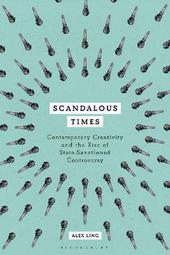
|
Scandalous Times: Contemporary Creativity and the Rise of State-Sanctioned Controversy
Paperback / softback
Main Details
| Title |
Scandalous Times: Contemporary Creativity and the Rise of State-Sanctioned Controversy
|
| Authors and Contributors |
By (author) Dr Alex Ling
|
| Physical Properties |
| Format:Paperback / softback | | Pages:208 | | Dimensions(mm): Height 216,Width 138 |
|
| Category/Genre | Philosophy - aesthetics
Social and political philosophy |
|---|
| ISBN/Barcode |
9781350068568
|
| Classifications | Dewey:302.24 |
|---|
| Audience | | Tertiary Education (US: College) | |
|---|
|
Publishing Details |
| Publisher |
Bloomsbury Publishing PLC
|
| Imprint |
Bloomsbury Academic
|
| Publication Date |
21 April 2022 |
| Publication Country |
United Kingdom
|
Description
We live in scandalous times. Every day some new controversy demands our attention, our emotional investment, and, ultimately, our judgment. Many of these routine transgressions will be understood in 'revelatory' terms, as peeling back the multiple layers of artifice and spin to reveal an underlying, and oftentimes disturbing, 'truth'. Otherswill be recognized as calculated marketing exercises that simply present the strategic face of contemporary capitalism. Yet these 'ordinary' scandals can themselves be seen to be largely derivative of another, altogether more fundamental-and fundamentally rare-form of disruption. Such is the real scandal that accompanies instances of authentic creation. Building on the philosophy of Alain Badiou, Scandalous Times not only argues the case for such 'real scandal', but also shows how it is today being abrogated and substituted through the increasing production of novel forms of state-sanctioned controversy. From Duchamp to Donald Trump, Scandalous Times explores the ways in which areas from art and advertising to politics and social media have come to actively contribute to this 'static' fabrication of controversy, all the while arguing for the need to rethink creativity as a radical exception to the state, and not its proxy.
Author Biography
Alex Ling is Senior Research Lecturer in Communication and Media Studies at Western Sydney University, Australia. He is the author of Badiou Reframed (2016) and Badiou and Cinema (2011) and co-editor and translator of Mathematics of the Transcendental (Bloomsbury, 2014).
ReviewsAlex Ling's Scandalous Times is a lucid argument that the realm of contemporary scandal is one in which everything changes so everything can stay the same. Against this conservatism, Ling provides a philosophical defence of the real scandal that would overturn our scandalous reality. * Benjamin Noys, Professor of Critical Theory, University of Chichester, UK * Alex Ling turns a much needed philosophical gaze on scandals, one of those key yet widely misunderstood concepts currently shaping our reactionary political age. Ling's lucid, challenging and thoroughly engaging analysis forces us to think of our current political moment as one saturated with "simulacral scandals" (or state-sanctioned controversies), both perversely satisfying an inevitable demand for shock and horror in times such as ours, and precluding any real change. Building on Badiouian philosophy, this timely and powerful book is not just a sharp and original account of how to think about scandals and the role they play in our societies, but a guide for how to reimagine them, and explore ways towards new political horizons and ultimately "the possibility of real happiness". * Aurelien Mondon, Senior Lecturer in Politics, University of Bath, UK * Alex Ling's new book presents a powerful argument on the nature of scandal and pseudo-scandal today through a concise and lucid account of Alain Badiou's theory of being and the scandalous event that occasionally irrupts within it, allowing for the possibility of real change. Along the way, Ling illuminates key aspects of the relationship between Badiou's thought and that of Jacques Lacan, and offers an important critique of contemporary media studies. Ling's book is a truly striking demonstration of the extraordinary potential of Badiou's thought for critical theory and cultural studies. It should be studied for its exemplary methodology as much for its original readings and conclusions. * Kenneth Reinhard, Professor of Comparative Literature and English, University of California, Los Angeles, USA *
|